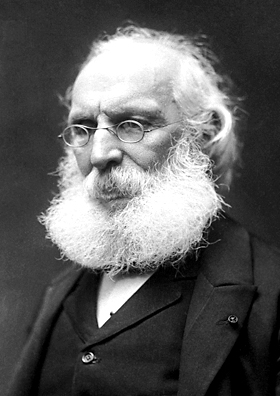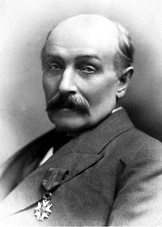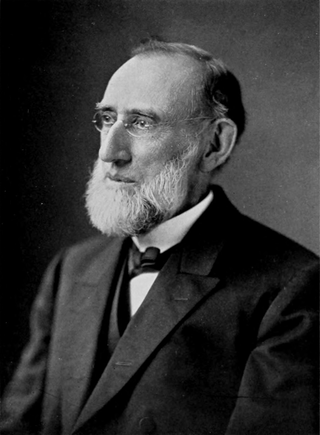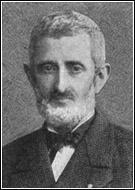Related Research Articles
The Universal Postal Union, established by the Treaty of Bern of 1874, is a specialized agency of the United Nations (UN) that coordinates postal policies among member nations, in addition to the worldwide postal system. The UPU contains four bodies consisting of the Congress, the Council of Administration (CA), the Postal Operations Council (POC) and the International Bureau (IB). It also oversees the Telematics and Express Mail Service (EMS) cooperatives. Each member agrees to the same terms for conducting international postal duties. The UPU's headquarters are located in Bern, Switzerland.

Clarissa Harlowe Barton was an American nurse who founded the American Red Cross. She was a hospital nurse in the American Civil War, a teacher, and a patent clerk. Since nursing education was not then very formalized and she did not attend nursing school, she provided self-taught nursing care. Barton is noteworthy for doing humanitarian work and civil rights advocacy at a time before women had the right to vote. She was inducted into the National Women's Hall of Fame in 1973.

Frédéric Passy was a French economist and pacifist who was a founding member of several peace societies and the Inter-Parliamentary Union. He was also an author and politician, sitting in the Chamber of Deputies from 1881 until 1889. He was a joint winner of the Nobel Peace Prize in 1901 for his work in the European peace movement.

Sir William Randal Cremer usually known by his middle name "Randal", was a British Liberal Member of Parliament, a pacifist, and a leading advocate for international arbitration. He was awarded the Nobel Peace Prize in 1903 for his work with the international arbitration movement.

Belva Ann Bennett Lockwood was an American lawyer, politician, educator, and author who was active in the women's rights and women's suffrage movements. She was one of the first women lawyers in the United States, and in 1879 she became the first woman to be admitted to practice law before the U.S. Supreme Court. Lockwood ran for president in 1884 and 1888 on the ticket of the National Equal Rights Party and was the first woman to appear on official ballots. While Victoria Woodhull is commonly cited as the first woman to run for president, she was not old enough to run, unlike Lockwood.

Marietta L. B. Stow was an American politician and women's rights activist. Throughout her career in law and politics, Stow advocated for women's suffrage, access to political office, and probate law reform.

Alfred Henry Love of Philadelphia, Pennsylvania, was an American political activist.

Elijah Benamozegh, sometimes Elia or Eliyahu, was an Italian Sephardic Orthodox rabbi and renowned Jewish Kabbalist, highly respected in his day as one of Italy's most eminent Jewish scholars. He served for half a century as rabbi of the important Jewish community of Livorno, where the "Piazza Benamozegh" now commemorates his name and distinction. His major work is Israel and Humanity (1863), which was translated into English by Dr. Mordechai Luria in 1995.
Events from the year 1912 in France.

Oakwood Friends School is a college preparatory school located at 22 Spackenkill Road in Poughkeepsie, New York, United States. With roots going back to Nine Partners Boarding School, founded in 1796, it is the oldest co-educational boarding and day school in New York state.

Lucretia Mott was an American Quaker, abolitionist, women's rights activist, and social reformer. She had formed the idea of reforming the position of women in society when she was amongst the women excluded from the World Anti-Slavery Convention held in London in 1840. In 1848, she was invited by Jane Hunt to a meeting that led to the first public gathering about women's rights, the Seneca Falls Convention, during which the Declaration of Sentiments was written.

Emma Beckwith was an American suffragette, bookkeeper, optician, and inventor.

Amanda Deyo was an American Universalist minister, pacifist, and correspondent. She was also a founder of women's right societies.

The Passy family is a French political family which had prominent members in 19th Century politics and 20th Century linguistics. Notable members of the family are all descended from Louis François Passy. He was born in Eure in northern France, and members of the family remained within the area for over a century.
Nettie Sanford Chapin was a 19th-century American teacher, historian, author, newspaper publisher, suffragist, and activist. Chapin wrote mostly prose. She also wrote on Iowa history, and published several small books herself. While residing at Washington, D.C. for several winters, she wrote concerning society and fashionable Washington circles. In 1875, she began the publication of The Ladies Bureau, the first newspaper published west of Chicago by a woman. Chapin served as chair of the National Committee of the National Equal Rights Party.

Anna White was a Shaker Eldress, social reformer, author, and hymn writer.

Elizabeth O. Sampson Hoyt was an American philosopher, author, and lecturer of the long nineteenth century. She served as Vice President of the Universal Peace Union and Chair of the "National University Committee of Four Hundred".

Ella B. Ensor Wilson was an American social reformer and writer of the long nineteenth century associated with the women's suffrage and temperance movements. She was a strong advocate of "equal rights" and although her birth place was in Maryland, a slave State, and having been reared and educated under that influence, she was always opposed to slavery. Wilson supported women's causes with her influence and money. A year and a half before her death, she was declared insane.
Woman's National Press Association (W.N.P.A.) was an American professional association for women journalists. The constitution declared that the object of the association was to advance and encourage women in literary work, and to secure the benefits arising from organized effort. Any woman who had published original matter in book form, or in any reputable journal, was entitled to membership. Any woman's press association could become auxiliary to this association by subscribing to its constitution and paying ten percent per capita annually into its treasury. Established in Washington, D.C., July 10, 1882, it ended its activities in the mid-1920s.

The 1901 Nobel Peace Prize was the first peace prize resulting from Alfred Nobel's will to recognize in the preceding year those who "have done the most or the best work for fraternity between nations, for the abolition or reduction of standing armies and for the holding and promotion of peace congresses." It was equally divided between the Swiss humanitarian Henri Dunant (1828–1910) "for his humanitarian efforts to help wounded soldiers and create international understanding" and the French pacifist Frédéric Passy (1822–1912) "for his lifelong work for international peace conferences, diplomacy and arbitration." It was the first of the many times the Nobel Peace Prize has been shared between two or more individuals.
References
- ↑ Ted Gottfried (2006). The Fight for Peace: A History of Antiwar Movements in America. Twenty-First Century Books. p. 47. ISBN 9780761329329.
- ↑ "Extracts from Charter, Constitution, and Objects of the Universal Peace Union". The Peacemaker. Vol. 31. Universal Peace Union. November–December 1912. p. 41. Retrieved 31 December 2016.
- ↑ "Alfred H. Love" (PDF). New York Times . June 30, 1913. Retrieved 31 December 2016.
Alfred H. Love, President of the Universal Peace Union since its formation in 1866 ...
- ↑ Memorial of Adin Ballou. Riverside Press. 1890. p. 74. Retrieved 31 December 2016.
- ↑ "Walsh, Rev. Walter". Who Was Who. 1 December 2007. doi:10.1093/ww/9780199540884.013.U218737.
- ↑ "Our Memorial Tribute to Clara Barton". The Peacemaker. Vol. 31. Universal Peace Union. April–June 1912. pp. 69–73. Retrieved 31 December 2016.
- ↑ Carol Faulkner (2011). Lucretia Mott's Heresy: Abolition and Women's Rights in Nineteenth-Century America. University of Pennsylvania Press. p. 199. ISBN 978-0812205008 . Retrieved 31 December 2016.
- ↑ Alfred H. Love (September 1912). "Memorial Tribute to Frederic Passy". The Peacemaker. Vol. 31. Universal Peace Union. pp. 177–183. Retrieved 31 December 2016.
- ↑ "Mary Frost Ormsby" Salt Lake Herald (October 11, 1891): 3. via Newspapers.com

- ↑ Alfred H. Love (July–August 1912). "Memorial Tribute to Hon. Ex-Governor John W. Hoyt". The Peacemaker. Vol. 31. Universal Peace Union. pp. 133–140. Retrieved 31 December 2016.
- ↑ "Wilsonton, Kan., Dec. 1, 1898". The Wilsonton Journal. 1 December 1898. p. 4. Retrieved 23 May 2022– via Newspapers.com.
- ↑ Jill Norgren (2008). Belva Lockwood: Equal Rights Pioneer. Twenty-First Century Books. p. 81. ISBN 9780822590682 . Retrieved 31 December 2016.
- ↑ Brinton, Ellen Starr (March 1943). "The Rogerenes". The New England Quarterly. 16 (1): 3–19. doi:10.2307/361127. JSTOR 361127.
- ↑ "Universal Peace Union Records". Swarthmore College. Retrieved 31 December 2016.